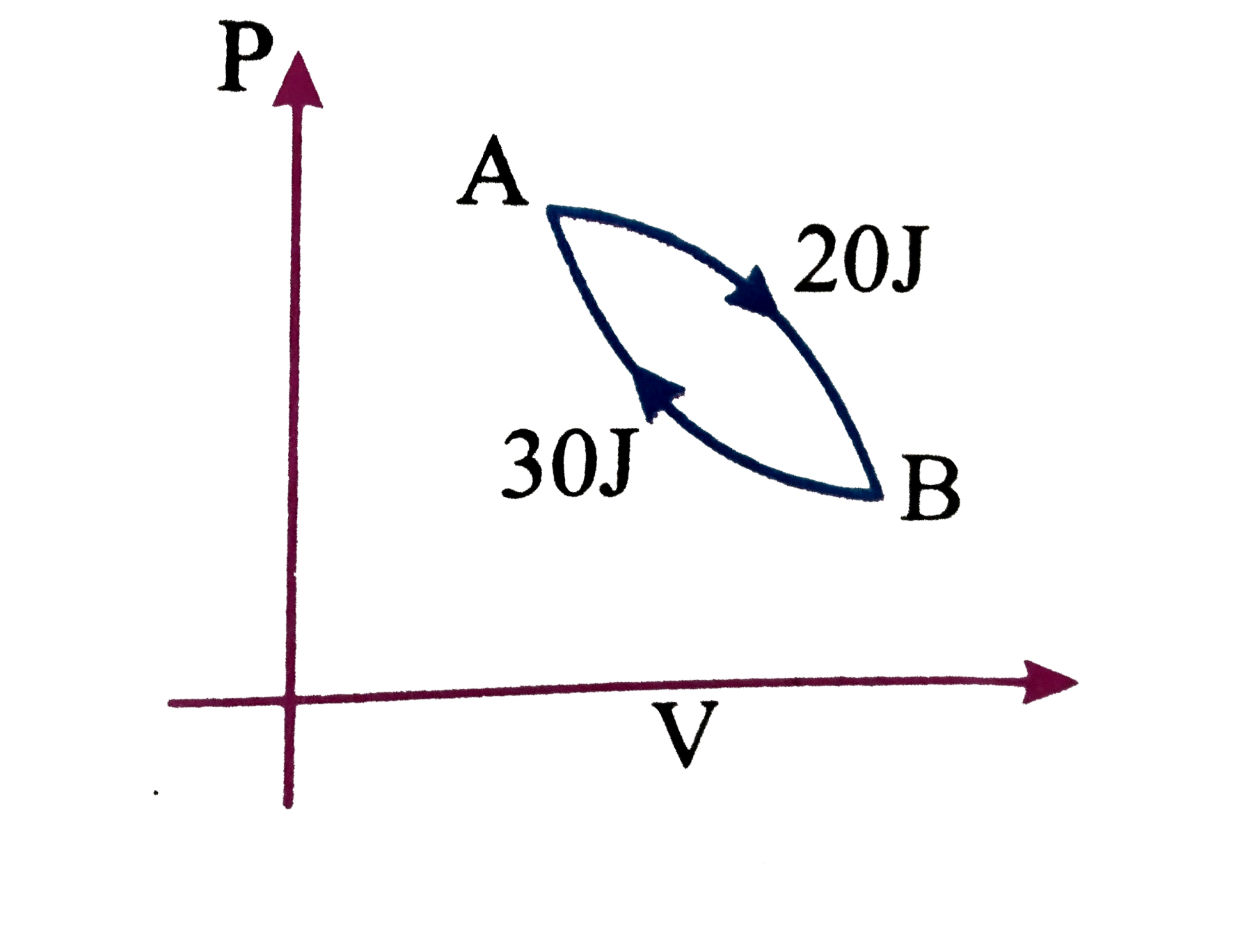A gas absorbs 100Calorie of heat and performs 150J of work. Increase energy of the gas in the process is
420J
570J
270J
none of these
The correct Answer is:C
To find the increase in the internal energy of the gas, we can use the first law of thermodynamics, which states:
ΔU=Q−W
where:
- ΔU is the change in internal energy,
- Q is the heat absorbed by the system,
- W is the work done by the system.
Step 1: Convert heat from calories to joules
The heat absorbed by the gas is given as 100 Cal. We need to convert this to joules using the conversion factor 1 Cal=4.2 J.
Q=100 Cal×4.2 J/Cal=420 J
Step 2: Identify the work done
The work done by the gas is given as 150 J.
W=150 J
Step 3: Apply the first law of thermodynamics
Now, we can substitute the values of Q and W into the first law equation to find ΔU.
ΔU=Q−W
ΔU=420 J−150 J
Step 4: Calculate the change in internal energy
Now, perform the subtraction:
ΔU=270 J
Thus, the increase in the internal energy of the gas is 270 J.
Final Answer:
The increase in energy of the gas in the process is 270 J.
---
- ΔU is the change in internal energy,
- Q is the heat absorbed by the system,
- W is the work done by the system.
The heat absorbed by the gas is given as 100 Cal. We need to convert this to joules using the conversion factor 1 Cal=4.2 J.
The work done by the gas is given as 150 J.
Now, we can substitute the values of Q and W into the first law equation to find ΔU.
ΔU=420 J−150 J
Now, perform the subtraction:
The increase in energy of the gas in the process is 270 J.
Topper's Solved these Questions
- THERMODYNAMICSBook:PRADEEPChapter:THERMODYNAMICSExercise:Problems for practice
Explore 54 Videos
- THERMODYNAMICSBook:PRADEEPChapter:THERMODYNAMICSExercise:Multiple choice questions (NCERT)
Explore 10 Videos
- THERMODYNAMICSBook:PRADEEPChapter:THERMODYNAMICSExercise:NCERT Questions
Explore 10 Videos
- SYSTEMS OF PARTICLES AND ROTATIONAL MOTIONBook:PRADEEPChapter:SYSTEMS OF PARTICLES AND ROTATIONAL MOTIONExercise:Assertion- Reason Type questions
Explore 20 Videos
- WORK, ENERGY AND POWERBook:PRADEEPChapter:WORK, ENERGY AND POWERExercise:Assertion-Reason Type Questions
Explore 24 Videos
Similar Questions
Find the change in internal energy of a gas when (i) it absorbs 80 calorie of heat and performs work equal to 170 Joule (ii) it absorbs 20 calorie of heat and work equal to 55 Joule is performed on it.
View SolutionA system works in a cyclic process. It absorbs 20 calories of heat and rejects 60J of heat during the process. The magnitude of work done (J) is [1calorie=4.2J]:
View Solution
Knowledge Check
A system absorbs reversibly 600 J of heat and performs 250 J of work. The increase in the internal energy of system is :-
A850 JB250 JC600 JD350 JFive moles of an ideal monoatomic gas with an initial temperature of 150∘C expand and in the process absorb 1500 J of heat and does 2500 J of work. The final temperature of the gas in .∘C is (ideal gas constant R=8.314JK−1mol−1)
A134B126C144D166A gas receives an amount of heat equal to 110 J and performs 40 J of work. The change in the internal energy of the gas is
A70 JB150 JC110 JD40 J
"600J" of heat is added to a monatomic gas in a process in which the gas performs a work of "150J" .The molar specific heat capacity of the gas for the process is
View SolutionIn a cyclic process shown in the figure an ideal gas is adiabatically taken from BtoA, the work done on the gas during the process BtoA is 30,J when the gas is taken from A to B the heat absorbed by the gas is 20J Then change in internal energy of the gas in the process A to B is :

View SolutionIn a cyclic process shown in the figure an ideal gas is adial gas is adiabatically taken from BtoA, the work done on the gas during the process BtoA is 30,J when the gas is taken from A to B the heat absorbed by the gas is 20J Then change in internat energy of the gas in the process A to B is :

View SolutionStatement 1: Heat supplied to a gas is process is 100 J and work done by the gas in the same process is 120 J, then pressure of he gas in the process should increase.
because
Statement2: Work done by the gas is greater than the heat supplied to the gas. Hence, internal energy of the gas should decrease.
View SolutionA system absorbs 640 J heat and does work. The change in internal energy (ΔU) for the process is 380 J. The work done by the system is __ J
View Solution